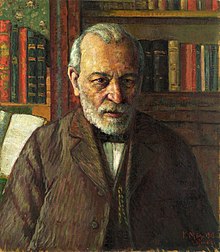Friedrich Kuhlbars

Friedrich Kuhlbars (* 5. jul. / 17th August 1841 greg. In Uniküla , then rural community Laatre, parish Sangaste , Livonia , today rural community Valga , Valga County , Estonia ; † 28. January 1924 in Viljandi ) was an Estonian poet .
life and work
Friedrich Kuhlbars was born the son of a school teacher. He attended the primary and district school in Tartu. From 1859 to 1861 he studied at the German language teacher training college in Tartu (German Dorpat ). In 1861 he worked as a private tutor in Gulbene ( Schwanenburg ). From 1862 to 1895 he was a teacher and later head of the German-speaking boys' school in Viljandi ( Fellin ). In 1895, under the sign of Russification, he was dismissed from school by the tsarist authorities due to a lack of knowledge of Russian . He then lived as a freelance writer, occupied himself a lot with Estonian mythology and place name research.
Friedrich Kuhlbars was best known to his contemporaries as a poet under the name Villi Andi . It stands in the tradition of German romanticism . Even before the Estonian poet Lydia Koidula , he wrote idyllic and patriotic-Estonian poems, which today are almost only known as settings. In 1863 his poetry collection Wastse laulo ja kannel was published in the dialect of his homeland . His lyrics for male choirs became famous (especially Wanemuine ehk Neljakordna Laulu-Lõng , 1870), song books for schools and songs for children, which were successfully used in school lessons. In 1904 he published the collection of poems Vom Ostseestrande in German under the pseudonym Fritz Klüse .
In 1919 Kuhlbars' patriotic poetry collection Kannel ja mõõk , which is dedicated to the Estonian War of Independence , was published. In 1923/24 his collected poems appeared in three volumes under the title Luuletused .
Kuhlbars is now buried in the Viljandi cemetery. A memorial stone today commemorates him on the site of his burned down house in the village of Uniküla.
Works (selection)
- Wastse laulo ja kannel (1863)
- Laulik koolis ja kodus (1868)
- Vanemuine ehk Neljakordne Laulu-Lõng (1870)
- Viliènde (1877)
- Laste laulik (1899)
- From the Baltic Sea Beach (1904)
- Kooli kannel (1908)
- Jõulu-pähkled ja teised luuletused (1910)
- Kannel ning mõõk (1919)
- Villi Andi Luuletused I (1923)
- Villi Andi Luuletused II (1923)
- Villi Andi Luuletused III (1924)
literature
- Cornelius Hasselblatt: History of Estonian Literature. Berlin, New York 2006 ( ISBN 3-11-018025-1 ), pp. 267f.
Web links
- CV, pictures, texts (Estonian)
Individual evidence
- ↑ Archived copy ( Memento of the original from September 27, 2007 in the Internet Archive ) Info: The archive link was inserted automatically and has not yet been checked. Please check the original and archive link according to the instructions and then remove this notice.
- ↑ Eesti Elulood. Tallinn: Eesti Entsüklopeediakirjastus 2000 (= Eesti Entsüklopeedia 14) ISBN 9985-70-064-3 , p. 190
- ↑ Archive link ( Memento of the original from May 20, 2007 in the Internet Archive ) Info: The archive link was inserted automatically and has not yet been checked. Please check the original and archive link according to the instructions and then remove this notice.
| personal data | |
|---|---|
| SURNAME | Kuhlbars, Friedrich |
| ALTERNATIVE NAMES | Villi Andi; Klüse, Fritz |
| BRIEF DESCRIPTION | Estonian lyric poet |
| DATE OF BIRTH | 17th August 1841 |
| PLACE OF BIRTH | Uniküla (Valga) , today the rural municipality of Valga , Valga County , Estonia |
| DATE OF DEATH | January 28, 1924 |
| Place of death | Viljandi |